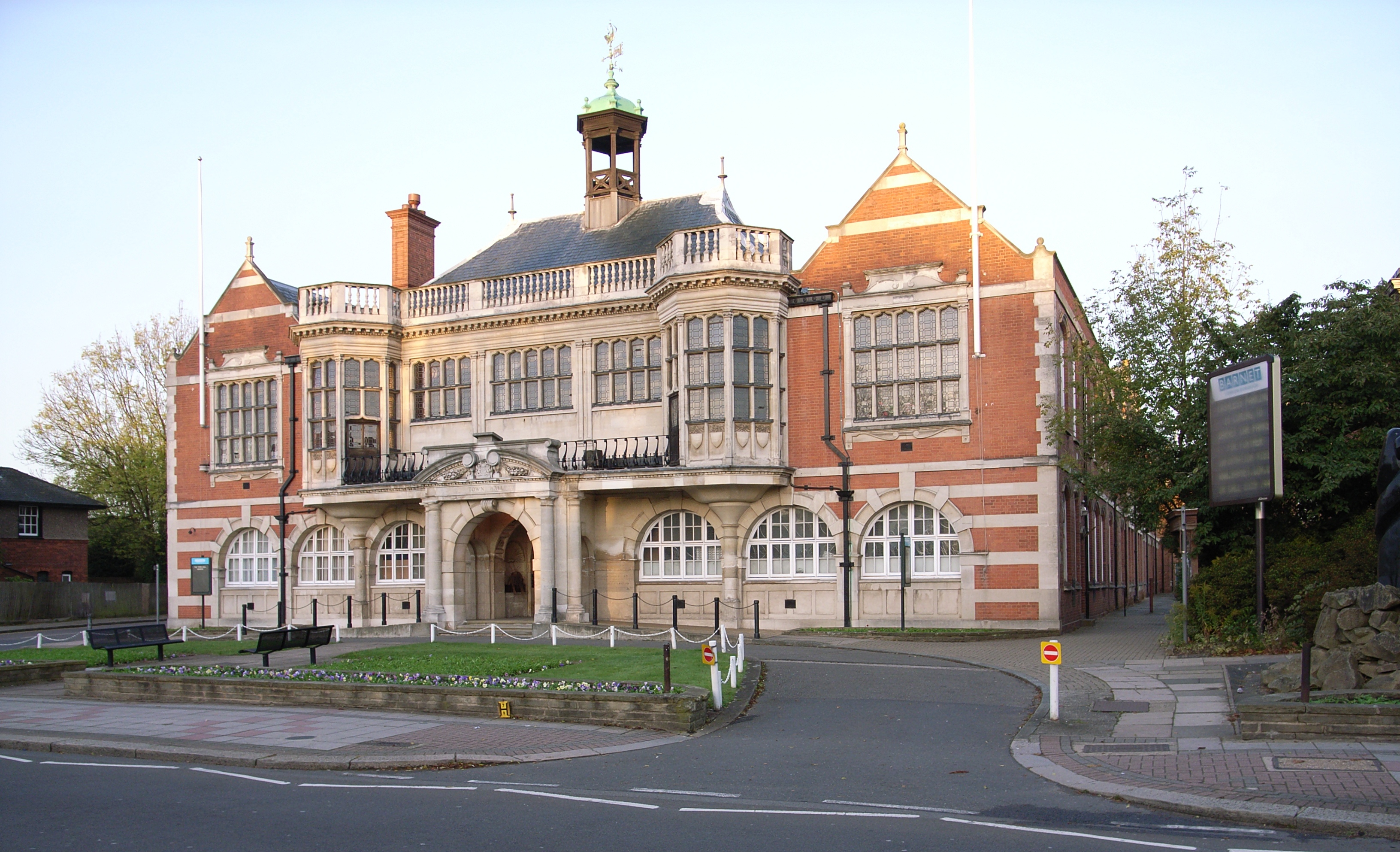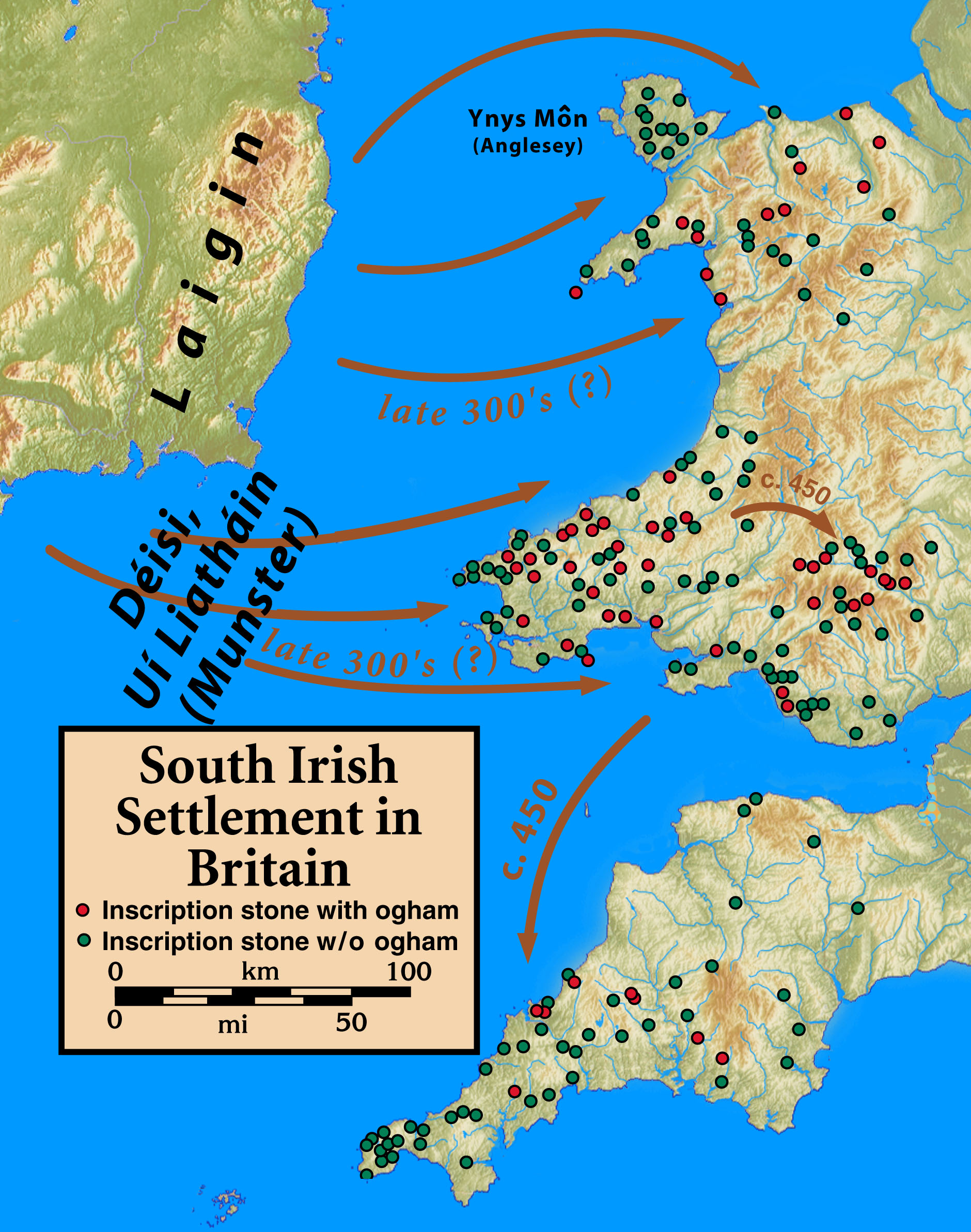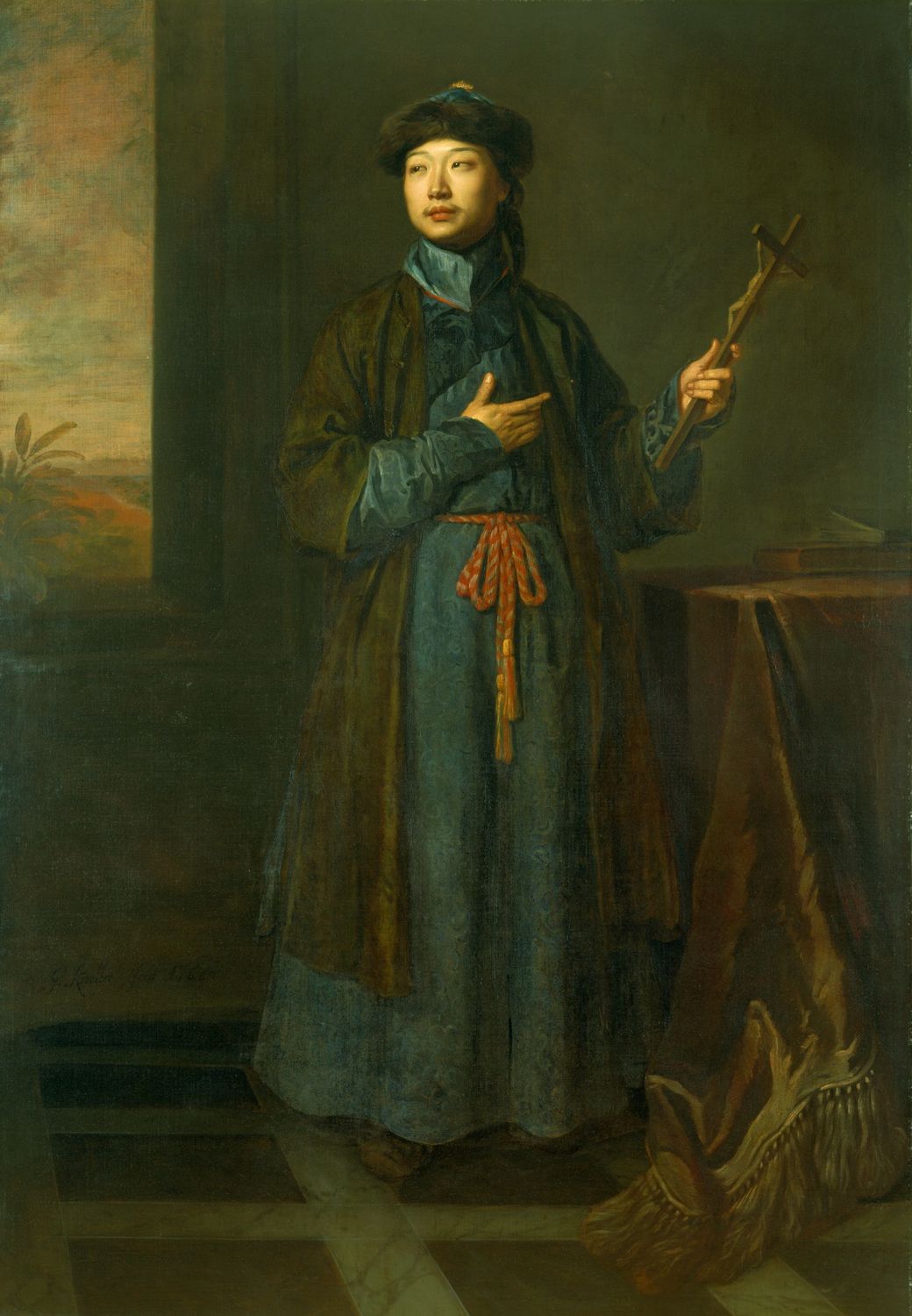|
London Borough Of Barnet
The London Borough of Barnet () is a suburban London borough in North London. The borough was formed in 1965 from parts of the ceremonial counties of Middlesex and Hertfordshire. It forms part of Outer London and is the largest London borough by population with 384,774 inhabitants, also making it the 13th largest district in England. The borough covers an area of , the fourth highest of the 32 London boroughs, and has a population density of 45.8 people per hectare, which ranks it 25th. Barnet borders the Hertfordshire district of Hertsmere to the north and five other London boroughs: Camden and Haringey to the southeast, Enfield to the east, as well as Harrow and Brent to the west of the ancient Watling Street (now the A5 road). The borough's major urban settlements are Hendon, Finchley, Golders Green, Friern Barnet, Chipping Barnet, Whetstone, and Edgware; there are also village settlements notably Totteridge and Arkley along with rural areas and countryside pa ... [...More Info...] [...Related Items...] OR: [Wikipedia] [Google] [Baidu] |
London Boroughs
The London boroughs are the 32 local authority districts that together with the City of London make up the administrative area of Greater London; each is governed by a London borough council. The present London boroughs were all created at the same time as Greater London on 1 April 1965 by the ''London Government Act 1963'' and are a type of local government district. Twelve were designated as Inner London boroughs and twenty as Outer London boroughs. The City of London, the historic centre, is a separate ceremonial county and local government district that functions quite differently from a London borough. However, the two counties together comprise the administrative area of Greater London as well as the London Region, all of which is also governed by the Greater London Authority. The London boroughs have populations of between 150,000 and 400,000. Inner London boroughs tend to be smaller, in both population and area, and more densely populated than Outer London borough ... [...More Info...] [...Related Items...] OR: [Wikipedia] [Google] [Baidu] |
Irish Briton
Irish migration to Great Britain has occurred from the earliest recorded history to the present. There has been a continuous movement of people between the islands of Ireland and Great Britain due to their proximity. This tide has ebbed and flowed in response to politics, economics and social conditions of both places. Today, millions of residents of Great Britain are either from Ireland or are entitled to an Irish passport due to having a parent or grandparent who was born in Ireland. The modern era of Irish migration has also seen non-indigenous Asian Irish and black Irish people move to Britain. It is estimated that as many as six million people living in the UK have at least one Irish grandparent (around 10% of the UK population). The Irish diaspora ( ga, Diaspóra na nGael) refers to Irish people and their descendants who live outside Ireland. This article refers to those who reside in Great Britain, the largest island and principal territory of the United Kingdom. Migr ... [...More Info...] [...Related Items...] OR: [Wikipedia] [Google] [Baidu] |
ONS Coding System
ONS codes are geocodes maintained by the United Kingdom's Office for National Statistics to represent a wide range of geographical areas of the UK, for use in tabulating census and other statistical data. These codes are also known as GSS codes, where GSS refers to the '' Government Statistical Service'' of which ONS is part. The previous hierarchical system of codes was replaced as from January 2011 by a nine-character code for all types of geography, in which there is no relation between the code for a lower-tier area and the corresponding parent area. The older coding system has now been phased out. Geography of the UK Census Information from the 2011 Census is published for a wide variety of geographical units. These areas include: * Counties in England * Districts within English counties, and Unitary Authority areas served by one council providing district and county functions * Unitary council areas in Wales, Scotland, and Northern Ireland * Civil parishes ( communit ... [...More Info...] [...Related Items...] OR: [Wikipedia] [Google] [Baidu] |
Postcodes In The United Kingdom
Postal codes used in the United Kingdom, British Overseas Territories and Crown dependencies are known as postcodes (originally, postal codes). They are alphanumeric and were adopted nationally between 11 October 1959 and 1974, having been devised by the General Post Office (Royal Mail). A full postcode is known as a "postcode unit" and designates an area with several addresses or a single major delivery point. The structure of a postcode is two alphanumeric codes that show, first, the Post Town and, second, a small group of addresses in that post town. The first alphanumeric code (the Outward code or Outcode) has between two and four characters and the second (the Inward Code or Incode) always has three characters. The Outcode indicates the postcode area and postcode district. It consists of one or two letters, followed by one digit, two digits, or one digit and one letter. This is followed by a space and then the Incode which indicates the postcode sector and delivery point ... [...More Info...] [...Related Items...] OR: [Wikipedia] [Google] [Baidu] |
British Summer Time
During British Summer Time (BST), civil time in the United Kingdom is advanced one hour forward of Greenwich Mean Time (GMT), in effect changing the time zone from UTC±00:00 to UTC+01:00, so that mornings have one hour less daylight, and evenings one hour more. BST begins at 01:00 GMT every year on the last Sunday of March and ends at 01:00 GMT (02:00 BST) on the last Sunday of October. The starting and finishing times of daylight saving were aligned across the European Union on 22 October 1995, and the UK retained this alignment after it left the EU; both BST and Central European Summer Time begin and end on the same Sundays at 02:00 Central European Time, 01:00 GMT. Between 1972 and 1995, the BST period was defined as "beginning at two o'clock, Greenwich mean time, in the morning of the day after the third Saturday in March or, if that day is Easter Day, the day after the second Saturday in March, and ending at two o'clock, Greenwich mean time, in the morning of the day ... [...More Info...] [...Related Items...] OR: [Wikipedia] [Google] [Baidu] |
Greenwich Mean Time
Greenwich Mean Time (GMT) is the mean solar time at the Royal Observatory in Greenwich, London, counted from midnight. At different times in the past, it has been calculated in different ways, including being calculated from noon; as a consequence, it cannot be used to specify a particular time unless a context is given. The term 'GMT' is also used as one of the names for the time zone UTC+00:00 and, in UK law, is the basis for civil time in the United Kingdom. English speakers often use GMT as a synonym for Coordinated Universal Time (UTC). For navigation, it is considered equivalent to UT1 (the modern form of mean solar time at 0° longitude); but this meaning can differ from UTC by up to 0.9s. The term GMT should thus not be used for purposes that require precision. Because of Earth's uneven angular velocity in its elliptical orbit and its axial tilt, noon (12:00:00) GMT is rarely the exact moment the Sun crosses the Greenwich Meridian and reaches its highest po ... [...More Info...] [...Related Items...] OR: [Wikipedia] [Google] [Baidu] |
Other Ethnic Group (United Kingdom Census)
A number of different systems of classification of ethnicity in the United Kingdom exist. These schemata have been the subject of debate, including about the nature of ethnicity, how or whether it can be categorised, and the relationship between ethnicity, race, and nationality. National statistics History and debate The 1991 UK census was the first to include a question on ethnicity. Field trials had started in 1975 to establish whether a question could be devised that was acceptable to the public and would provide information on race or ethnicity that would be more reliable than questions about an individual's parents' birthplaces. A number of different questions and answer classifications were suggested and tested, culminating in the April 1989 census test. The question used in the later 1991 census was similar to that tested in 1989, and took the same format on the census forms in England, Wales and Scotland. However, the question was not asked in Northern Ireland. The ... [...More Info...] [...Related Items...] OR: [Wikipedia] [Google] [Baidu] |
British Arab
British Arabs ( ar, عرب بريطانيا) are British citizens of Arab descent. They share a common Arab ethnicity, culture, language and identity from different Arab countries. Arabs also come from non-Arab countries as ethnic minorities. The majority of British Arabs reside in the British capital of London, and have come largely from the Arab countries of Egypt, Morocco, Palestine, Yemen, Lebanon, Iraq, and the Gulf States. Overview "British Arabs" is used as an ethnic designation by the National Association of British Arabs. It is also employed by academics, and in the media. Unlike Black British or Asian British, the term "British Arab" was not one of those employed in government ethnicity categorisations used in the 2001 UK Census and for national statistics. As a result, community members are believed to have been under-counted in previous population estimates according to the National Association of British Arabs (NABA). This absence of a separate "Arab" category i ... [...More Info...] [...Related Items...] OR: [Wikipedia] [Google] [Baidu] |
British African-Caribbean Community
British African-Caribbean people are an ethnic group in the United Kingdom. They are British citizens whose ancestry originates from the Caribbean or they are nationals of the Caribbean who reside in the UK. There are some self-identified Afro-Caribbean people who are multi-racial. The most common and traditional use of the term African-Caribbean community is in reference to groups of residents continuing aspects of Caribbean culture, customs and traditions in the UK. The earliest generations of Afro-Caribbean people to migrate to Britain trace their ancestry to a wide range of Afro Caribbean ethnic groups. African Caribbean people descend from disparate groups of African peoples who were brought, sold and taken from West Africa as slaves to the colonial Caribbean. In addition British African Caribbeans may have ancestry from various indigenous Caribbean tribes, and from settlers of European and Asian ethnic groups. According to the National Library of Medicine the aver ... [...More Info...] [...Related Items...] OR: [Wikipedia] [Google] [Baidu] |
Black British
Black British people are a multi-ethnic group of British citizens of either African or Afro-Caribbean descent.Gadsby, Meredith (2006), ''Sucking Salt: Caribbean Women Writers, Migration, and Survival'', University of Missouri Press, pp. 76–77. The term ''Black British'' developed in the 1950s, referring to the Black British West Indian people from the former Caribbean British colonies in the West Indies (ie, the New Commonwealth) now referred to as the Windrush Generation and people from Africa, who are residents of the United Kingdom and are British. The term ''black'' has historically had a number of applications as a racial and political label and may be used in a wider sociopolitical context to encompass a broader range of non-European ethnic minority populations in Britain. This has become a controversial definition. ''Black British'' is one of various self-designation entries used in official UK ethnicity classifications. Black residents constituted around ... [...More Info...] [...Related Items...] OR: [Wikipedia] [Google] [Baidu] |
British Chinese
British Chinese (also known as Chinese British or Chinese Britons) are people of Chineseparticularly Han Chineseancestry who reside in the United Kingdom, constituting the second-largest group of Overseas Chinese in Western Europe after France. The British Chinese community is thought to be the oldest Chinese community in Western Europe. The first waves of immigrants came between 1842 (the end of the First Opium War) and the 1940s (the end of World War II), largely through treaty ports opened as concessions to the British for the Opium Wars, such as Canton, Tianjin and Shanghai. Some of the early British Chinese were also Eurasians. An estimated 900 Chinese-Eurasian born as result of marriages from Chinese fathers and white mothers of various ethnic backgrounds; the most common being British and Irish. Most British-Chinese of Eurasian origin were concentrated in around the Liverpool area of Chinatown, where there was a growing Chinese-Eurasian community. Many of them had assimil ... [...More Info...] [...Related Items...] OR: [Wikipedia] [Google] [Baidu] |
British Bangladeshis
British Bangladeshis ( bn, বিলাতী বাংলাদেশী, Bilatī Bangladeshī) are people of Bangladeshi diaspora, Bangladeshi origin who have attained citizenship in the United Kingdom, through immigration and historical naturalisation. The term can also refer to their descendants. Bengali Muslims have prominently been migrating to the UK since the 1940s. Migration reached its peak during the 1970s, with most originating from the Sylhet Division. The largest concentration live in east London boroughs, such as London Borough of Tower Hamlets, Tower Hamlets. This large diaspora in London leads people in Sylhet to refer to British Bangladeshis as Londoni ( bn, লন্ডনী). Bangladeshis form one of the UK's largest group of people of overseas descent and are also one of the country's youngest and fastest growing communities. The 2011 United Kingdom census, 2011 UK Census recorded nearly half-a-million residents of Bangladeshi ethnicity. While in the 2021 ... [...More Info...] [...Related Items...] OR: [Wikipedia] [Google] [Baidu] |







